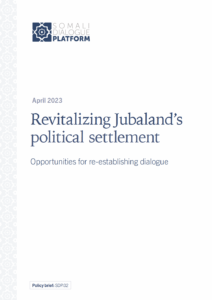Overview
Since the formation of Jubaland state in 2012, decades of conflict have given way to increased stability across parts of the region. Even so, insecurity, political violence and humanitarian crises have persisted amid recurrent tensions between Jubaland and the Federal Government of Somalia (FGS). Indeed, political fragmentation continues to characterize dynamics in the state: al-Shabaab controls most of Middle Juba, while there is an absence of cooperation between leaders in Gedo and the Jubaland administration. Instability in Jubaland recently escalated into major episodes of violence, with conflict between the state administration and the FGS playing out in Gedo during 2019–2021.
Jubaland’s instability arises in part from the weakness of its ‘political settlement’—the underlying rules of the game agreed among political actors regarding the distribution of, and competition, for power. Jubaland’s political settlement has several key shortcomings. First, there has never been a lasting, stable agreement on sharing resources across the state, especially revenue raised from Kismayo port and border points with Ethiopia and Kenya. Competition for Kismayo especially, as the region’s de facto capital, has been at the centre of violent conflict dynamics for the past 30 years and continues to drive competition between groups.
Second, Jubaland’s security landscape is fragmented between Gedo, Middle Juba and Lower Juba regions, with most security actors focused on political competition rather than ensuring security for citizens.
Third, there has been limited scope for open and inclusive governance. Many communities’ express grievances over the clan power-sharing arrangements undergirding Jubaland institutions, while previous ‘election’ processes have come under criticism for political interference and lack of transparency. Although much of the competition for control of Kismayo has centred on a few dominant clan groupings, it has also been characterized by the marginalization of less powerful clans, who lack effective representation in institutions or the space to participate in decision-making.
Fourth, since 2012, the state’s relations with the FGS have often been tense and conflictual, with successive federal administrations seeking to project power and align with factions in Jubaland, exacerbating already volatile political dynamics.
Fifth, regional actors have aggravated conflict dynamics by supporting competing groups in Jubaland.
Finally, al-Shabaab, which remains outside Somalia’s political settlement, still holds its main stronghold in Middle Juba and continues to conduct attacks across Jubaland and the wider country.
These weaknesses in Jubaland’s political settlement facilitated the tensions and violence that emerged alongside the protracted national election struggle beginning in 2019. Even following the conclusion of the election process in May 2022, they continue to be associated with political instability and conflict potential. Most recently, tensions have flared due to the state legislature approving a one-year term extension for the parliament and president. The next Jubaland elections had been scheduled for August 2023, with the lead-up set to be extremely contentious in light of attempts by marginalized groups to alter clan power-sharing norms. The term extension has only added to this contention.
If real progress in peacebuilding, development and governance is to be sustained, Jubaland’s political settlement must be transformed, creating an environment in which an inclusive range of actors can agree on how best to distribute and compete for power. To that end, this brief outline possible pathways for re-establishing dialogue around a consensus-based election process, thereby laying the groundwork for a wider transformation in political settlement dynamics.
This report is a product of the Somali Dialogue Platform. The Somali Dialogue Platform is a programme which supports Somalis to achieve consensus on contentious political issues and is implemented by the Rift Valley Institute. The Somali Dialogue Platform is funded by the UK Foreign, Commonwealth and Development Office (FCDO), the Ministry of Foreign Affairs of Denmark, and the United States Agency for International Development (USAID).




